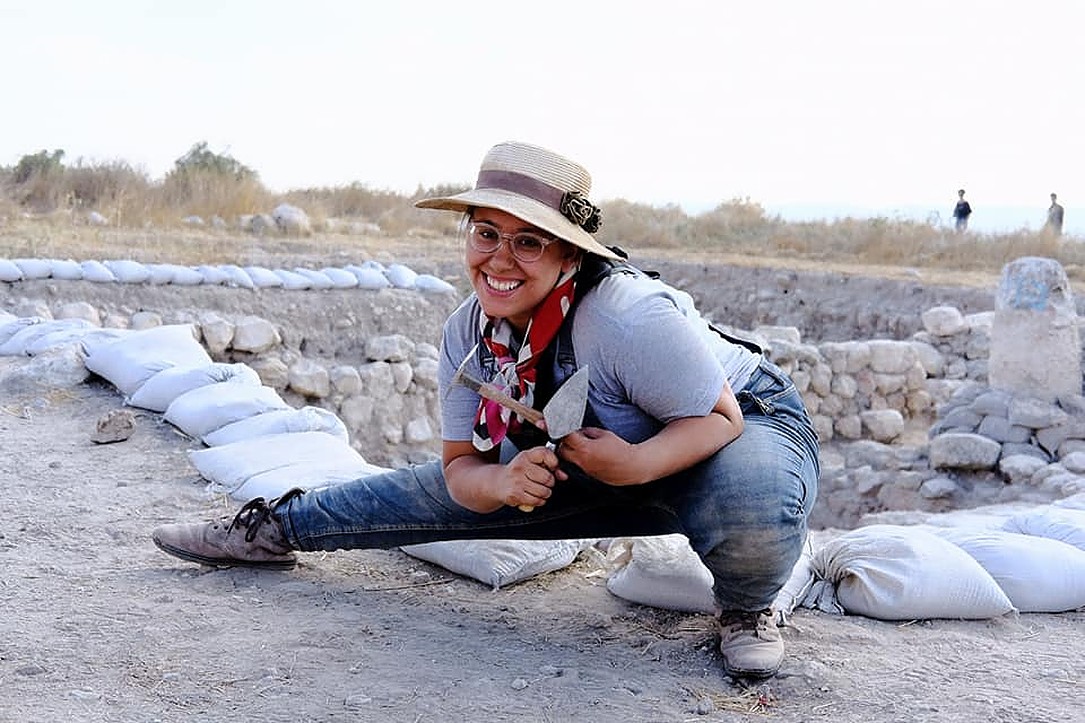
USask archaeology student intends to repatriate ancestral items, remains as a step toward reconciliation
Micaela Champagne, a Métis student, is studying archaeology in College of Arts and Science at the University of Saskatchewan.
By Kim FontaineThrough her work at Science Outreach, Champagne is striving toward delivering Indigenous science perspectives to students in Saskatoon. She is working to reclaim her culture and language as an Indigenous woman to positively influence her students by leading by example and honouring the generations that came before her. Her hope for her archaeology career is to repatriate as many of her Indigenous ancestral items and remains as possible. Champagne also excels academically and is also engaged within her community.
Champagne is being recognized with a leadership award at this year’s Indigenous Student Achievement Awards, to be held virtually on Feb. 4, 2021. The awards honour Indigenous students studying at USask, in recognition of their academic excellence, leadership, research, community engagement and resiliency.
The award ceremony is part of Indigenous Achievement Week (IAW), which celebrates the successes and contributions of Métis, First Nations and Inuit students, staff and faculty within the context of this year’s theme: nīkānihk itohtētān, walking together into the future. IAW also offers a series of online events and workshops that everyone is welcome to participate in.
We asked Champagne a few questions about her journey with USask.
Why did you choose the archaeology program?
When I first entered university in 2013, I had no intention to take the path that I’m currently on. I had to take some time off school to focus on my mental health. School had taken its toll on me, so I needed time to re-evaluate what I wanted out of my degree. It was during this break that I decided to travel to Egypt, as I was able to observe workers restoring the paintings in King Tutankhamen’s tomb. This sparked my interest in archaeology which made me register for these classes at USask.
Why is it important to repatriate ancestral items and remains?
I think it is important to not just acknowledge Canada’s dark past of colonial violence against Indigenous Peoples but to also accompany this with action. This action includes the repatriation of ancestral remains and artifacts. This isn’t something that is often discussed but is becoming more apparent in the public eye. These ancestors and artifacts were often stolen by institutions so that they could be studied, preserved and analyzed, with no regard for the communities that they were taken from. To further the repatriation of these artifacts and remains, the federal government must enact federal legislation that protects these ancestors and items. Although it does seem quite hopeless when you realize how much was taken from us as Indigenous people, I think that there is a bright future for Indigenous archaeology, one that is founded by informed consent and mutual collaboration between researchers and communities.
How have your studies developed your knowledge, skills and leadership?
Through both my studies and employment at USask, I have been able to develop and expand my knowledge. Through my work as a science outreach instructor, along with my co-instructors, I have been finding ways to highlight Indigenous science perspectives. This has been through much learning and listening from my Kokum (grandmother), who I am grateful to have the opportunity to absorb knowledge from her. It is also the opportunity to both teach and learn from my students, and it is always exciting to start lessons with a Cree or Michif phrase to set the tone for the lesson. My studies have allowed me to learn more in-depth about the relationship between Indigenous people and archaeology. I would have not known the extent of how much was taken from Indigenous people, had I not taken courses on the subject. My studies in bioarchaeology, a course by Dr. Angela Lieverse (PhD), allowed me to explore the legislation (rather, the lack of legislation) and UNDRIP regulations for protecting Indigenous artifacts and remains. From this research, it is clear that more must be done.
Has someone in your life inspired you to get to where you are today?
I come from a family of some pretty amazing women. My mother is one of those amazing women who has constantly encouraged me to pursue my education. From a young age she instilled the knowledge that “education is the one thing that no one can take away from you.” She’s right, of course! She has fought to open doors for other Indigenous women, she has faced discrimination and racism in her fight and yet she still persists. I want to persevere, even just a fraction of what she has so that I too can hopefully open doors for Indigenous youth.
This year’s Indigenous Achievement Week theme is nīkānihk itohtētān, walking together into the future. What does this mean to you?
All voices should be honoured and are worthy to be heard and are worthy of respect. In order to move forward, we must honour those who came before us and recognize past and present violence. We must heal with action and not just words.
Tell us anything about yourself that you would like us to share.
It has been my purpose to reclaim as much of my ancestral knowledge from my Kokum, this includes the language, medicines and ceremony. This is to ensure that these practices remain for generations to come. I hope to pass on these teachings so that they will live on through me.
It has also been a goal of mine to travel the world and to explore as many places and cultures as possible. I have been privileged enough to have worked multiple jobs at a time that has allowed me to save up money to travel to 35-plus countries solo. This experience has made me more independent and confident in my abilities as well as allowing me to have a broader perspective of world events.


